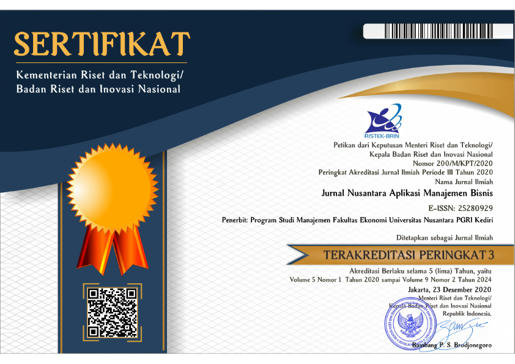Penerapan Sistem Informasi Akuntansi Syariah untuk Mematuhi Etika Bisnis Rumah Sakit
DOI:
https://doi.org/10.29407/nusamba.v6i1.15747Keywords:
Sistem Informasi Akuntansi Syariah, manajemen bisnis rumah sakit, UMLAbstract
The implementation of a sharia accounting information system (SIA) is needed for hospitals that are owned and whose patients are Muslim. Especially for hospitals that have been certified under sharia, it is imperative to own and operate a sharia SIA. The use of Islamic SIA can increase stakeholder satisfaction, especially hospital patients. The purpose of this paper is to explain how the Integrated IT Program can simultaneously improve hospital performance. We use Unified Modeling Language (UML) to develop Sharia AIS. The location of the observation in the context of community service is Muhammadiyah Hospital in Lamongan. The computerized AIS program is developed using UML while the database server uses MySQL and PHP as compilers. The approach to this report is qualitative based. Data were collected by interview, outside observation, and relevant documentation. Review The findings of this report indicate an increase in performance in terms of: new patient registration, invoice creation, printing of financial reports, and monitoring of accounts receivable. The four indicators show performance in terms of shorter working hours. SIA Syariah continues to be developed until all computerized systems are integrated for better compliance with hospital business ethics.
Downloads
References
A. M. Vadastreanu, D. Maier, and A. Maier, “Is the Success Possible in Compliance with Ethics and Deontology in Business?,” Procedia Econ. Financ., vol. 26, no. 15, pp. 1068–1073, 2015, doi: 10.1016/s2212-5671(15)00931-4.
Keith Davis, “The Case for and against Business Assumption of Social Responsibilities,” Acad. Manag. J., vol. 16, no. 2, pp. 312–322, 1973, doi: DOI: 10.2307/255331.
J. Lassinantti, A. Ståhlbröst, and M. Runardotter, “Relevant social groups for open data use and engagement,” Gov. Inf. Q., vol. 36, no. 1, pp. 98–111, 2019, doi: 10.1016/j.giq.2018.11.001.
A. Saha, S. Kar, and M. Maiti, “Multi-item fuzzy-stochastic supply chain models for long-term contracts with a profit sharing scheme,” Appl. Math. Model., vol. 39, no. 10–11, pp. 2815–2828, 2015, doi: 10.1016/j.apm.2014.10.034.
E. Beddewela, “Managing corporate community responsibility in multinational corporations: Resolving institutional duality,” Long Range Plann., vol. 52, no. 6, p. 101911, 2019, doi: 10.1016/j.lrp.2019.101911.
K. M. Benzies, V. Shah, K. Aziz, A. Lodha, and R. Misfeldt, “The health care system is making ‘too much noise’ to provide family-centred care in neonatal intensive care units: Perspectives of health care providers and hospital administrators,” Intensive Crit. Care Nurs., vol. 50, pp. 44–53, 2019, doi: 10.1016/j.iccn.2018.05.001.
A. D. Souza and V. Vaswani, “Diversity in approach to teaching and assessing ethics education for medical undergraduates: A scoping review,” Ann. Med. Surg., vol. 56, no. June, pp. 178–185, 2020, doi: 10.1016/j.amsu.2020.06.028.
A. Nazarian, P. Atkinson, and P. Foroudi, “Influence of national culture and balanced organizational culture on the hotel industry’s performance,” Int. J. Hosp. Manag., vol. 63, pp. 22–32, 2017, doi: 10.1016/j.ijhm.2017.01.003.
A. Z. Acar and P. Acar, “The Effects of Organizational Culture and Innovativeness on Business Performance in Healthcare Industry,” Procedia - Soc. Behav. Sci., vol. 58, pp. 683–692, 2012, doi: 10.1016/j.sbspro.2012.09.1046.
A. Sandu and A. C. (Frunză), “Some Considerations on the Construction of Ethics Policies. Shared Ethics and Communicative Action,” Procedia - Soc. Behav. Sci., vol. 149, pp. 846–854, 2014, doi: 10.1016/j.sbspro.2014.08.325.
A. Marina and S. Imam Wahjono, “Business Ethics As a Basis for Designing the Vision and Mission Hospitals: Empirical Evidences From Muhammadiyah Hospital Ponorogo, Indonesia,” J. Econ. Business, Account. | Ventur., vol. 16, no. 3, p. 399, 2013, doi: 10.14414/jebav.v16i3.220.
R. Scheyvens, G. Banks, S. Vunibola, H. Steven, and L. Meo-Sewabu, “Business serves society: Successful locally-driven development on customary land in the South Pacific,” Geoforum, vol. 112, no. June 2019, pp. 52–62, 2020, doi: 10.1016/j.geoforum.2020.03.012.
P. P. Groumpos, “Making the World a Better Place to Live through Wisdom and Philosophy: «Πάντων χρημάτων μέτρον άνθρωπος » ‘Men is the measure of all things’ Protagoras,” IFAC-PapersOnLine, vol. 51, no. 30, pp. 744–749, 2018, doi: 10.1016/j.ifacol.2018.11.203.
M. N. Mamat, S. F. Mahamood, and I. Ismail, “Islamic Philosophy on Behaviour - Based Environmental Attitude,” Procedia - Soc. Behav. Sci., vol. 49, pp. 85–92, 2012, doi: 10.1016/j.sbspro.2012.07.008.
I. Sila and K. Cek, “The impact of environmental, social and governance dimensions of corporate social responsibility: Australian evidence,” Procedia Comput. Sci., vol. 120, pp. 797–804, 2017, doi: 10.1016/j.procs.2017.11.310.
M. Mahdavikhou and M. Khotanlou, “New Approach to Teaching of Ethics in Accounting ‘Introducing Islamic Ethics into Accounting Education,’” Procedia - Soc. Behav. Sci., vol. 46, pp. 1318–1322, 2012, doi: 10.1016/j.sbspro.2012.05.294.
A. Marina and S. Imam Wahjono, “Business Ethics for Business Sustainability in Muhammadiyah Hospital: Evidence From Ponorogo, Indonesia,” J. Indones. Econ. Bus., vol. 32, no. 3, p. 178, 2017, doi: 10.22146/jieb.17146.
KODEKI, Pengurus Besar Ikatan Dokter Indonesia. 2012.
Komite Etika Ikatan Akuntan Indonesia, “Draft Exposure: Kode Etik Akuntan Profesional,” no. November, pp. 1–63, 2016.
J. Mohammad, F. Quoquab, and R. Omar, “Factors Affecting Organizational Citizenship Behavior among Malaysian Bank Employees: The Moderating Role of Islamic Work Ethic,” Procedia - Soc. Behav. Sci., vol. 224, no. August 2015, pp. 562–570, 2016, doi: 10.1016/j.sbspro.2016.05.440.
S. Harvard, G. R. Werker, and D. S. Silva, “Social, ethical, and other value judgments in health economics modelling,” Soc. Sci. Med., vol. 253, no. March, p. 112975, 2020, doi: 10.1016/j.socscimed.2020.112975.
S. Sievers-Glotzbach and J. Tschersich, “Overcoming the process-structure divide in conceptions of Social-Ecological Transformation: Assessing the transformative character and impact of change processes,” Ecol. Econ., vol. 164, no. December 2018, p. 106361, 2019, doi: 10.1016/j.ecolecon.2019.106361.
F. Cardoso et al., “A multi-stakeholder approach in optimising patients’ needs in the benefit assessment process of new metastatic breast cancer treatments,” Breast, vol. 52, pp. 78–87, 2020, doi: 10.1016/j.breast.2020.04.011.
P. Ahi and C. Searcy, “Assessing sustainability in the supply chain: A triple bottom line approach,” Appl. Math. Model., vol. 39, no. 10–11, pp. 2882–2896, 2015, doi: 10.1016/j.apm.2014.10.055.
J. Gualandris, R. D. Klassen, S. Vachon, and M. Kalchschmidt, “Sustainable evaluation and verification in supply chains: Aligning and leveraging accountability to stakeholders,” J. Oper. Manag., vol. 38, pp. 1–13, 2015, doi: 10.1016/j.jom.2015.06.002.
P. S. Brønn and D. Vidaver-Cohen, “Corporate motives for social initiative: Legitimacy, sustainability, or the bottom line?,” J. Bus. Ethics, vol. 87, no. SUPPL. 1, pp. 91–109, 2009, doi: 10.1007/s10551-008-9795-z.
Downloads
Published
Issue
Section
License
Authors who publish with this journal agree to the following terms:
- Copyright on any article is retained by the author(s).
- The author grants the journal, the right of first publication with the work simultaneously licensed under a Creative Commons Attribution License that allows others to share the work with an acknowledgment of the work’s authorship and initial publication in this journal.
- Authors are able to enter into separate, additional contractual arrangements for the non-exclusive distribution of the journal’s published version of the work (e.g., post it to an institutional repository or publish it in a book), with an acknowledgment of its initial publication in this journal.
- Authors are permitted and encouraged to post their work online (e.g., in institutional repositories or on their website) prior to and during the submission process, as it can lead to productive exchanges, as well as earlier and greater citation of published work.
- The article and any associated published material is distributed under the Creative Commons Attribution-ShareAlike 4.0 International License












